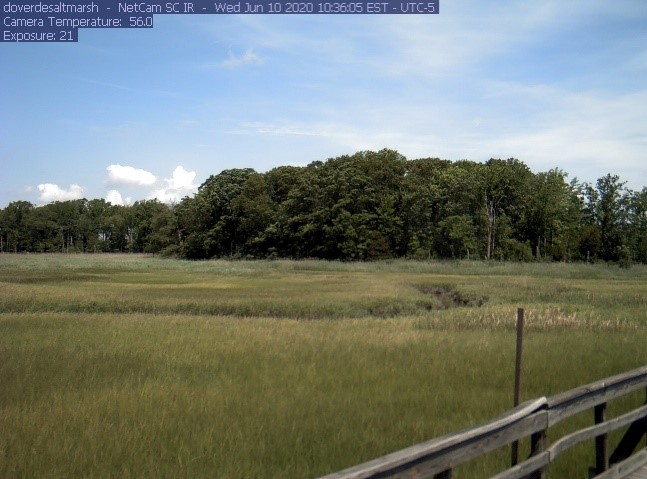DNREC’s Delaware Coastal Programs conducts a variety of coastal research programs to study the affects of climate change, impacts from human pollutants, and other factors impacting the changing coastal environment of Delaware.
302-739-6377
Shoreline erosion is an ongoing concern for many coastal communities and habitats. Traditional shoreline armoring techniques, such as bulkheads, can decrease estuarine habitat and ecosystem services.
A potential solution has been the use of “gray-green” infrastructure approaches which use both manmade and natural materials to protect habitats while providing an ecological uplift.
Delaware Coastal Programs has begun a project to install and monitor a “green bulkhead” to test whether traditional bulkheads could be adapted to have more ecological value. This project is inspired and adapted from a “green bulkhead” project designed and installed by the Maryland Coastal Bays National Estuary Program.
The green bulkhead approach uses PVC designed like a Peruvian Flute. Native tidal marsh plants will be planted into the PVC to add habitat and greenery in front of an already installed bulkhead.
This project tests the idea that adding this structure will keep the shoreline stable but provide more habitat for native fish, crabs, and other fauna.

Marsh migration is an important process in tidal marshes. As sea level rises, many tidal wetlands have the ability to move inland. However, accelerating sea level rise rates, land barriers, and other factors can affect this process. Additionally, that landward marsh migration can impact other coastal habitats, such as the creation of ghost forests.
Monitoring marsh migration is an important part of understanding how this horizontal habitat change is occurring. This is especially important at the ecotone — the boundary area where different habitat types are transitioning (the space between the tidal marsh and upland forest for example).
Delaware Coastal Programs is implementing a long-term ecotone monitoring effort to help assess how marsh migration is occurring at the Delaware National Estuarine Research Reserve. This will leverage on-going emergent tidal wetland vegetation monitoring data to better understand marsh changes with sea level rise.
Legacy organic pollutants are chemicals that remain in the environment for long periods of time. These pollutants include polychlorinated biphenyls (PCBs) and polycyclic aromatic hydrocarbons (PAHs), many of which have known toxicological effects on the environment and human health.
The St. Jones River watershed near Dover is a highly urbanized system with a known legacy of PCB and PAH contamination, among other pollutants.
Delaware Coastal Programs is conducting efforts to better understand the presence and fate of organic contaminants in marsh habitats within the St. Jones River. This includes a PCB bioaccumulation pilot study to determine the concentrations of PCBs at the base of the tidal marsh food web.
Data will help inform if larger scale investigation is needed and can help identify organisms at risk.
Delaware Coastal Programs has also previously collected sediments from five points along the St. Jones River to measure PAH concentrations and conduct a sediment toxicity test at each site. These sites will periodically be revisited to understand how PAH concentrations are changing downriver.
In 2019, the Delaware Coastal Management Program received a NOAA Coastal Zone Management Project of Special Merit to better understand the potential economic impacts to Delaware resulting from simulated offshore oil spills.
The goal of this project was to provide information for Delaware’s coastal decision-makers to assess potential impacts to the local economy in the event of an offshore oil spill.
The project had two parts, each resulting in comprehensive reports:
To model oil fate and transport to Delaware under different offshore spill scenarios (View a recorded webinar on the report).
An economic impacts assessment of the modeled offshore oil spills (View a recorded webinar on the report).
Related Topics: climate coastal energy, coastal programs, research, science